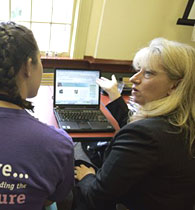-
(单词翻译:双击或拖选)
The World Community Grid1 is joining together individual personal computers to create massive processing power. The technology is helping2 reduce research time from years to months. Transcript3 of radio broadcast:
29 June 2008
This is the VOA Special English Development Report.
 |
| Anne McNeil (right) with IBM Corporate4 Community Relations, shows the World Community Grid to a student at Meredith College in North Carolina |
A project called the World Community Grid has found a way for computers connected to the Internet to help solve humanitarian5 problems. The World Community Grid is making technology available to public and non-profit organizations to use in humanitarian research.
Scientists at the University of Washington, for example, are using the technology to study ways to improve the nutritional6 value of rice. Another research project supported by the World Community Grid is studying mathematical ways to design drugs to treat the disease AIDS. Other projects are studying cancer. And still others are studying climate change in Africa.
The success of the World Community Grid depends upon individuals collectively donating their extra computer power. This is based on the idea that most computers are inactive most of the time. During these times they are not used, they can help solve complex scientific or engineering problems.
The IBM corporation started the World Community Grid more than two years ago. The company continues to provide advice and support to the project. Stanley Litow heads community relations for IBM. He says anyone in the world with a computer connected to the Internet can join the project.
Volunteers download a program from the World Community Grid Web site. Every so often, the program uploads results or downloads more information to be processed. Individuals can also find out how much work their computer power has done on the Web site.
Currently, about one million personal computers in one hundred countries are involved in the World Community Grid. Mister Litow hopes that another million computers will join the project. Then, he says, the World Community Grid will become the world’s largest super computer able to do many projects a year.
Any researcher can sign up to use the grid’s super computing7 power. However, all findings from the studies must be made public. Mister Litow says not only is the technology free. But he says it will also lead to more knowledge and valuable scientific discoveries.
And that’s the VOA Special English Development Report, written by Jill Moss8. You can find a link to the World Community Grid and transcripts9 of our reports at voaspecialenglish.com. I’m Steve Ember.
 收听单词发音
收听单词发音
1
grid

|
|
| n.高压输电线路网;地图坐标方格;格栅 | |
参考例句: |
|
|
|
2
helping

|
|
| n.食物的一份&adj.帮助人的,辅助的 | |
参考例句: |
|
|
|
3
transcript

|
|
| n.抄本,誊本,副本,肄业证书 | |
参考例句: |
|
|
|
4
corporate

|
|
| adj.共同的,全体的;公司的,企业的 | |
参考例句: |
|
|
|
5
humanitarian

|
|
| n.人道主义者,博爱者,基督凡人论者 | |
参考例句: |
|
|
|
6
nutritional

|
|
| adj.营养的,滋养的 | |
参考例句: |
|
|
|
7
computing

|
|
| n.计算 | |
参考例句: |
|
|
|
8
moss

|
|
| n.苔,藓,地衣 | |
参考例句: |
|
|
|
9
transcripts

|
|
| n.抄本( transcript的名词复数 );转写本;文字本;副本 | |
参考例句: |
|
|
|















